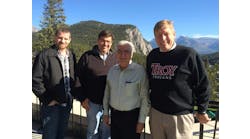Bouncing off the keynote by Steve Sonnenberg about Emerson Process Management's 2010 performance, motivational speaker Mark Sanborn laid out for attendees at the 2010 Emerson Global Users Exchange keys for bringing passion to their lives and work. Sanborn is the author of the best-selling book, The Fred Factor: How Passion in Your Work and Life Can Turn the Ordinary to the Extraordinary.
Using a mix of stories and jokes about Fred the mailman who did a very ordinary job extraordinarily well, Sanborn related Fred's passion for delivering the mail to people on his route in the best way possible to creating passion for any job—and thereby creating success and innovation.
Sanborn began by defining the Fred Factor as "the ability to bring excellence through dedication and passion." He added that "the most powerful strategy you have is to be fully engaged in what you do." Becoming fully engaged means developing the ability to appreciate the importance of the immediate, Sanborn says. "Fear nothing but wasting the present moment."
'Everybody makes a difference; the only question is what kind.' Motivational speaker Mark Sanborn inspired attendees at the 2010 Emerson Global Users Exchange with stories of the importance of engaging the world—and the people—around us.
This passionate attitude toward your work has practical manifestations in the way you build relationships with fellow workers and customers. It begins with a change in perspective, Sanborn says. It calls for recognizing that no one is unimportant. "Everybody makes a difference; the only question is what kind," he says. If confronted with non-performers in your work team, show them how what they do contributes to success, he says, adding, "When you value people, you add value to them."Also, Sanborn says, in your day-to-day transactions, create legitimate opportunities for personal exchange. For example, once in a while, turn the formulaic, "How are you?" into a genuine opportunity to find out about the other person.
Friend or Jerk?
"It doesn't take any more time to be a friend than to be a jerk," Sanborn says. He cites a survey in which most of the 1,200 people asked said they would rather seek advice from an incompetent friendly person than a competent jerk. "What we really want is to be able to get answers from competent friends."
Furthermore, Sanborn recommends not treating your customers as customers, but as friends. "People do business with you because they like you," he says. "You're willing to go the extra mile for your friends. Friends give friends the benefit of the doubt."
But building relationships takes more than that. Honesty is crucial, Sanborn says. "Tell the truth. Tell [customers or co-workers] what they need to hear."
Making the Best of Bad Times
In an era when everyone is challenged to do more with less, the key to success is to substitute imagination for money, Sanborn says. He cites the example of the Denver Zoo's product Zoop, which sells for $9.95 a can. It is essentially animal waste from the zoo marketed as fertilizer. "That's something—selling crap for $9.95 a can," he says.
Bringing that kind of ingenuity to your work and mixing it with your technological expertise is the key to success. "Ingenuity leveraged by technology is a winner," he says.
Finally, on the subject of the value of collaboration, Sanborn says, "Collaboration creates growth."
Sanborn then issued a challenge to Emerson Exchange attendees: "Collect business cards from four or five people you meet here this week. Then agree to exchange emails once a week answering this question: 'What great idea has seized you this week?'" Out of such exchanges will come your next great idea, he says.




